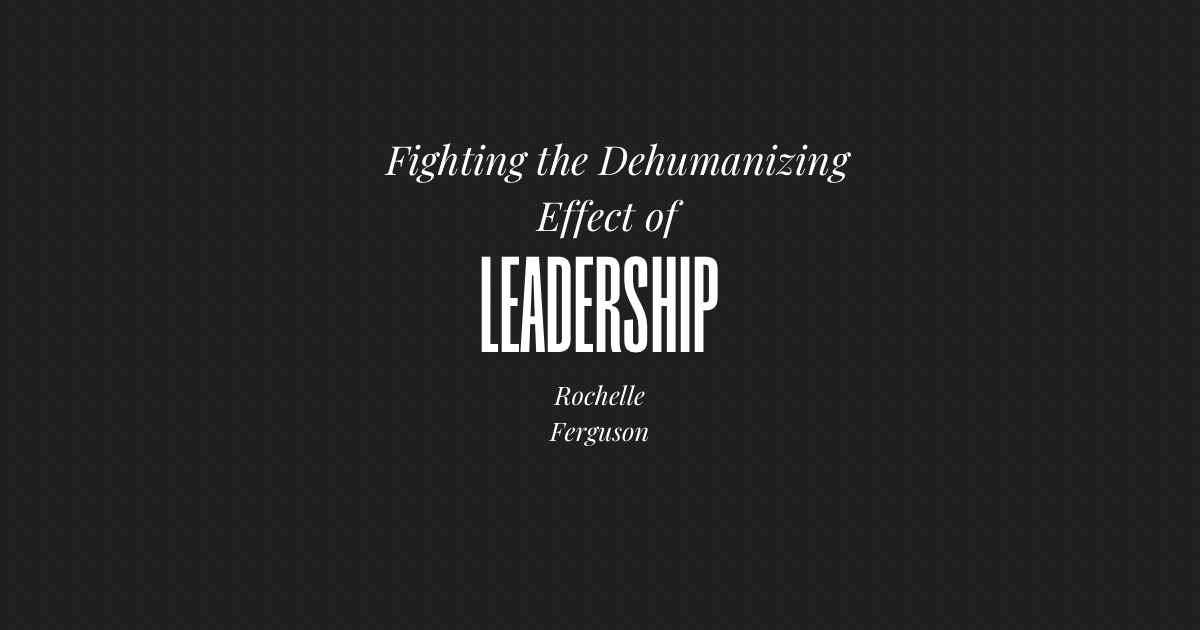Fighting the Dehumanizing Effect of Leadership

“I had forgotten what it was like to have someone speak to me like I was human,” I heard myself say over the phone to my husband who was over 600 miles away. These words that poured out over my lips, into the cell phone towers and through the receiver Jeff held in his hands didn’t lose their weight even through the distance.
Somewhere along the line, people stopped talking to me like a human being and more like a person they wanted to get things from. And somewhere along the line, I got used to it. I grew accustomed to it and I stopped putting up the fight for humanity. I gave into the plague of being a leader — isolation.
See, for the last twelve years of my life, I served alongside my husband as a lead pastor of a local church and for the eight years before that I served as a staff pastor at a few other local churches. There is a VAST difference in being a staff pastor and lead pastor — I’ll save that for another post — but the last twelve years I’ve spent trying to combat executive isolation.
I couldn’t pinpoint an exact time it started, but most of my relationships in this past decade have been based upon how I could serve the other person. Counseling, advice, conflict mediation, mentorship, teaching, praying, preaching — always pouring out. Very few ever pouring back, but there are a few for which I am grateful.
Very recently, we’ve transitioned out of local church leadership and into full-time Not On My Watch ministry. This transition has been one of the best things in my life and one of the hardest things in my life — all at the same time. God, in His providence, knew the exact timing of all of this well in advance.
I happened to have had a trip scheduled the very first week of our transition where I found myself in Dallas, Texas with a small group of leaders from our local Christian School. We were there for a one-day conference on spiritual formation in students and we spent the day learning how parents and educators can create environments for students to grow in their faith — it was right up my alley!
While it was a day full of encouragement, it was way more than what I ever anticipated.
The group of five adults, who had not really spent much time together, boarded a flight to Dallas and spent the next day and a half studying, laughing, dining and fellowshipping. This was the impotence of my comment to Jeff on the phone that shocked even my own ears as I said the words out loud.
None of these other leaders were looking to gain anything from me, none of them had ulterior motives for the information they would share with me, there was no gossip, no traps, no partial truths — just a group of people valuing the diversity of opinions and perspectives. Many of us came from different denominations and even different backgrounds, but ideas were able to be shared without demeaning one another.
It was refreshing.
Being an executive leader of an organization can be challenging. Being the wife of an executive leader can be overwhelming. You’ve seen the underbelly, and you begin to wonder who is “safe” and who is not. Some people share things with you that you know one day they will regret and end up feeling embarrassed over and they will distance from you in response. Some people share partial information to get you to “think differently” about another individual. Some people ignore you. Some people want to feel important and therefore spend time with you until their social credit is high enough to drop you. Some people simply just ghost you out of nowhere. While very few people honor you for the child of God you are.
So, why write this article? What am I hoping to communicate? I’ve listed a few takeaways below, but I want to be very overt with why I share these thoughts. If we begin to view people, who are loved and valued by the Creator, as means to a personal end – we are abusive. I don’t claim to be above the temptation to ignore the humanity of an individual in order to get what I need, but I do want to herald the cry to fight the temptation in myself and to help others gain awareness and courage to fight the temptation in them.
So, the next time you interact with someone in leadership. Take a moment of inventory. Am I valuing this person for who they are rather than what they can do for me? Am I genuinely interested in their well being or just how they can help me achieve my goals?
Here’s a few takeaways to ponder and implement:
- Every leader needs a few people in their life who value them for who they are in Christ, not for what they can do for you personally. I hope to be that for other women in ministry who don’t feel they have that.
- It’s important to understand the warning signs of losing your humanity. If you find that others are not valuing you for the person you are in Christ, then it is time to address that. That could mean a tough conversation, a change in location or another purposeful alteration.
- Be aware that it is possible to begin to devalue someone’s humanity by always “needing” something from them and failing to recognize that they don’t exist to meet the needs of others.
- Leaders need friends too. It’s important to cultivate healthy relationships outside of the organization you lead that can continue to encourage and challenge you.
- You’ll know if someone was just “using” you by how quickly they “drop” you when you can no longer serve their agenda. Run!